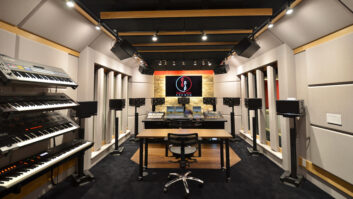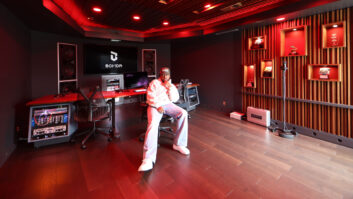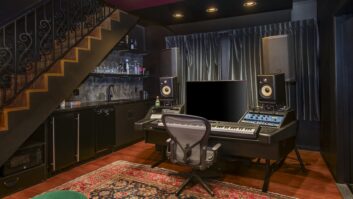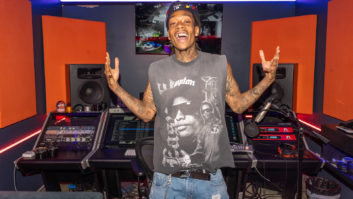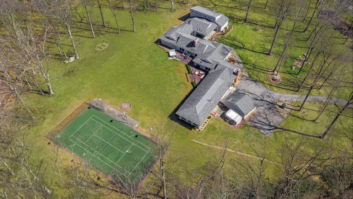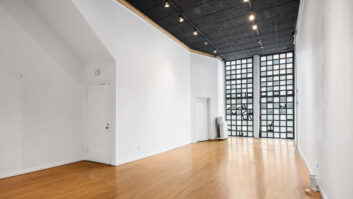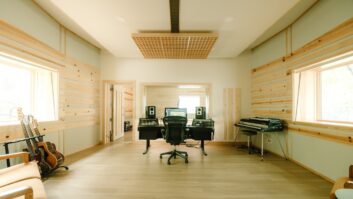
Atlanta, GA—By the middle of March of this year, coronavirus infections had spread through the United States to the point that major live event companies and record labels were forced to suspend all live performances for the foreseeable future. But while the music industry was shutting down, Atlanta rapper Lil Baby was having a breakout year and didn’t feel like stopping. He was ready to work.
Quality Control Music’s rookie-turned-franchise-star released his My Turn album in March, which became one of only three albums to spend at least three weeks atop the Billboard album chart this year. Forty percent of the album’s songs have already been individually certified Gold and Platinum, only adding to a four-year rap career that has attracted more than 12 billion streams.
The entire collection was mixed by Thomas “Tillie” Mann, who has worked on most albums released on Quality Control, so when Lil Baby wanted to keep working during the spring’s COVID-19 lockdown, he turned to Tillie. “When the pandemic happened, and everyone wasn’t moving around, he hit me like, ‘Put a studio at the house so I can keep recording. I want to record nonstop,” says Tillie. “Lil Baby and I have a great relationship, so he sort of trusts me. His thing is telling me, ‘Just do what you do.’”
Tillie has known Lil Baby since the artist was just 17-year-old Dominique Armani Jones, who hung around the Quality Control studio in 2013 and a rapping career was the furthest thing from his mind. Once he was released from prison in the summer of 2016, though, Baby hit the studio and began learning how to rap, with engineers congealing disparate freestyled recording takes of his into songs. That led to Lil Baby’s introduction to the world in April 2017 with his first mixtape, Perfect Timing. With Baby’s career starting to gain traction, Tillie knew the budding rapper needed a home studio to help sharpen his growing talent.

“I actually set up his first studio around August 2017,” says Tillie. “I set it up in a house because he was moving around so much and doing so much. That allowed him a place to get practice in all of the time.” Tillie created the first home studio in a back room of Lil Baby’s home, outfitting it with a Miktek C1 large-diaphragm condenser microphone surrounded by a reflection filter, feeding into a Universal Audio Apollo Twin interface.
How Hip-Hop Stars Are Recording During the Pandemic, by Keith Nelson Jr., May 22, 2020
Having a space to practice, record and try out new ideas made a difference. Since then, Tillie has made sure to keep the importance of a home studio at the top of the perpetually busy rapper’s mind. “If he moves into a new house or makes any changes to his life, I’m always like, ‘You need to put a studio in this house.’ I’ve been on him the last couple of years about getting his own studio for his team and his label.”
Artists are creatures of habit. While Lil Baby’s 2020 home studio isn’t 100 percent finished, when it is, it will have a lot of the same equipment that his first home studio had in 2017. Luckily, with experience and success comes access to better equipment. Already in use is a Telefunken Alchemy Series TF51 microphone feeding a Universal Audio Apollo x6 Mark III interface tied into Avid Pro Tools. Sets of Yamaha HS8 and HS5 studio monitors and a KRK 10S subwoofer are on hand, all accessed by an Audient Nero desktop monitor controller. Other useful necessities are there too, including an Arturia MiniLab MkII MIDI controller, FL Studio, and Antares Auto-Tune, among other gear.
“The room will be outfitted with acoustic panels,” Tillie says of the new home studio. “When we did his first studio … we planned to outfit it, but he ended up moving. Kaotica makes the Kaotica Eyeball that goes around the mic and gives pretty good isolation in the room, so we’re using that now, but going forward, we’ll be using acoustic panels.”

Tillie predicts the panel installation should only take a few days, but the pandemic has complicated things: “Due to everyone being home and everyone knowing they’d be at home, it was a big rush on ordering studio equipment. At first, a lot of stuff was out of stock and on backorder. I had to call in some favors to get some stuff expedited.”
There have been other issues to deal with as well. Between May 30 and June 5, Atlanta was under a strict 8 p.m. curfew to curb violence occurring simultaneous to widespread protests over George Floyd’s death in police custody. Tillie had to go to Baby’s home early in the day to get everything set up and have enough time to return home before curfew started.
Finneas on Producing Billie Eilish’s Hit Album in His Bedroom, by Steve Harvey, Jan. 28, 2020
While still incomplete, Lil Baby’s new facility has already brought him success. A week after Tillie had put together most of the home studio—while abiding by Atlanta’s curfew—Baby released the protest anthem song “The Bigger Picture” amid the George Floyd protests. Debuting at No. 3 on the Billboard Hot 100 chart, the potent track became his highest-charting song to date. By the end of July, the song was certified Gold, and it doesn’t seem like Lil Baby is slowing down anytime soon.
“Over the last 30 days during this pandemic, he’s been recording at the house,” Tillie says. “If he’s not recording every day, he’s recording every other day.”
Lil Baby • www.iamlilbaby.com
Quality Control Music • motownrecords.com/artists/quality-control-music

